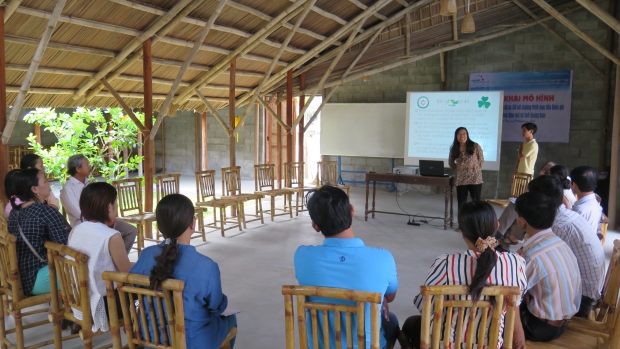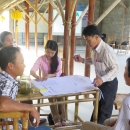Grants :: Small Grant Facilities :: Students and community to protect ecosystem and biodiversity through school garden model
Students and community to protect ecosystem and biodiversity through school garden model

Initial stakeholder meeting , Hoi An © Tran Viet Duy, 2016
Objectives
The project aims to build awareness raising programs for students, parents, and local enterprises on the importance of biodiversity protection, through school garden model of native plan species to provide environment for students to learn about biodiversity and organic farming.
Background
Hoi An city has been seen as a cultural, tourism an eco-city. However, Hoi An is now facing many environmental challenges such as coastal erosion, water pollution, biodiversity declines. With the significantly increase in tourism, many hotels and tourist services are in favor to introduce new plant species for landscape interiors. Local people are less aware of the importance and value of native species. Moreover, Hoi An City is now encouraging organic farming and conserving native species, emphasizing healthy farming practices and reducing the use of pesticide and environmental pollution.
Target beneficiaries
- 3,400 students from 08 schools
- School teachers and parents
- Local enterprises
Outputs
- 08 pilot school gardens;
- 02 education kits about native plant species for primary and junior high school students;
- 01 manual book on how to build school garden and nurturing with garden designs and lesson leant;
- 01 short movie about the project
Accomplishments and challenges
During the implementation of the pilot school garden in Ly Tu Trong primary school 2, the project has given chance for students and parents to give their comments about the design of the garden. After joining the project and understanding the importance of organic vegetables, one of the parents has invested to set up a garden at home. This is an indicator of success for the project because it showed that parents have started to care and take specific actions to protect biodiversity, environment and health of their family and community.
Moreover, realizing the effects of teaching ecological classes at schools, the board of education in Cam Thanh kindergarten has decided to use the content of these classes as pilot model for teachers. This school also shared the ecological classes model for other kindergartens to use through joining some contests organized by Hoi An City sub-DOET.
For Hoi An City, using the effects from pilot ecological classes program at 08 schools, Hoi An sub-DOET has started to cooperate with sub-DONRE to develop a teaching material set “Learning to live green” based on the pilot program.
The piloted school garden and lessons learnt from it are considered as a good model for other schools to follow. The manual book on how to build and use school gardens can be used for different schools within the project area and other areas.
As a result, the project not only supports building 08 school gardens that meet proper criteria, but it also helps to build capacity for teachers and local staff while improves the quality of environmental education for students. The project also helped to increase the awareness on values of organic agriculture, native plant species such as folk medicinal herbs, and food safety, which are some of the objectives in agriculture sector of Hoi An City.
Contributions to cross-cutting themes
- Climate change: The project helps local people realize the importance and neccesity of conserving native plant species as well as maintaining local biodiversity, particularly in coastal villages/communes like Cam Thanh, Cam An, and Cua Dai. Keeping that in mind, they will have better awareness in protecting Casurina trees and beach morning glory vines in Cua Dai coast or Nypa palm areas of Cam Thanh commune.
- Gender equality: During the project implementation, female teachers and farmers have good environment to join and help with editing content and teaching classes on native plant species. Parents, especially mothers and sisters in many families join students in building and nurturing school gardens.
Lessons Learned
Response to practical needs: In order to implement the actitivies effectively with the participation from students, parents and schools, the project always respects their opinions and applies integrated planning among stakeholders to address their actual needs and integrate into suitable content of the project. During the designing and building process of the school gardens, the project always create open conditions for students, parents and schools to contribute their ideas and finalize the design that fits the needs of schools. For example, primary schools and kindergartens have mostly boarding students who need more of organic vegetables gardens while junior high schools wish to build more of folk medicinal herbs garden for teaching and learning purpose.
Create links between project activities and school activities: project activities should be integrated into school activities to maintain sustainability of the project. For example, when creating teaching materials for ecological classes, the project has worked based on the content of main courses taught at school to build the new teaching material set. Therefore, teachers find it quite easy to integrate the content of ecological classes into main classes.
Project Facts
Country
Location
Hoi An City, Quang Nam Province
Topic
- Capacity development
- Civil Society Engagement
- Community Resilence
- Climate change
- Knowledge management and communications
- Private sector partnerships
Duration
1st Mar 2016 to 1st Mar 2017
MFF Grant Amount
VND 313,900,000
Co-financing Partner
Action Center for City Development (ACCD)
VND 212,294,000
Implementing Partner
Action Center for City Development (ACCD)
Representatives of Implementation agency:
Ms Dang Huong Giang – Director of ACCD
Adress: 57 Tran Phu, Hoi An City, Quang Nam Province
Tel.: (84) 05106 - 527105
